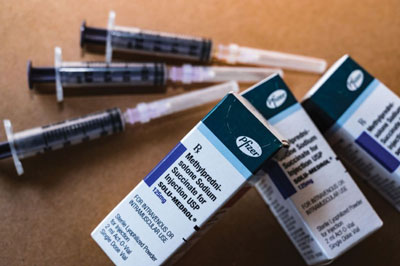
Questions linger about Pfizer’s new vaccine as Black people remain among those hit hardest by the still-surging coronavirus.
By Bruce C.T. Wright
(Source NewsOne):
Source: NurPhoto / Getty
The news of Pfizer‘s success with its coronavirus vaccine trials has prompted a wave of optimism for the future as Covid-19 surges with a deadly vengeance across most of the U.S. But there are still plenty of lingering questions, including, but definitely not limited to, the distribution process that will determine who gets the coronavirus vaccine first.
There’s also another key question looming: Will Black people even take it once it’s available to them?
Since data shows that Black people are disproportionately affected by the virus, conventional wisdom might suggest that’s to whom the vaccine should be prioritized for once it’s ready to be rolled out to the masses. But the rollout strategy provided by the U.S. government doesn’t seem to prioritize anyone group even as Pfizer’s vaccine trials made sure to include a racially diverse set of participants in part because of the disproportionate effect that Covid has had on minority and other marginalized populations.
The vaccine boasts a purported 90 percent success rate in trial participants, 42 percent of whom were reportedly from diverse racial and ethnic backgrounds. And “experts” from the Department of Defense have tamed up with the Centers for Disease Control and Prevention (CDC) and parts of the Department of Health and Human Services “to coordinate supply, production, and distribution of vaccines,” according to an 11-page plan about Operation Warp Speed, which is supposed to ensure “that every American who wants to receive a COVID-19 vaccine can receive one, by delivering safe and effective vaccine doses to the American people beginning January 2021.”
But the references to the portions of the U.S. population who need it most are fleeting at best and non-specific at worst.
One part of the plan says that “work has begun with organizations representing minority populations and vulnerable communities, with consultation already occurring with more than 150 organizations dedicated to addressing health disparities.” Another part says “demand is likely to vary regionally and in diverse populations within a given geographic area,” calling for “Nimble delivery and allocation strategies.”
It seemingly left more questions than answers about how and to whom the vaccine will be first rolled out.
However, with that said, even if the plan did single out Black people, it’s unclear which would be more challenging: being able to effectively deliver it to them or getting them to voluntarily be vaccinated with it, what with Black folk’s historical mistrust among doctors, physicians and the entire American healthcare system.
To be sure, the CDC’s statistics on hospitalization and death by race and ethnicity shows that Black people are more than twice as likely to die as those from all other backgrounds after contracting the coronavirus.
A report published by the National Institutes of Health attributed part of Black folks’ mistrust of American medicine to “the historical legacy of mistreatment at the hands of the medical profession” along with “the Tuskegee syphilis experiment, and current health disparities.”
A separate study called Color of Coronavirus by APM Research Lab concluded in June that Black people’s fear of clinical racism must be addressed in any coronavirus vaccine trial.
The Tuskegee Study of Untreated Syphilis In the Negro Male involved infected Black men being solicited for a 40-year study (1932 to 1972) to treat syphilis with penicillin. They were offered free medical exams, free meals and burial insurance.
However, they were not provided with the drug, and 28 of the original 399 Black men died of syphilis, 100 died from related complications, 40 of their wives were infected, and 19 of their children were born with congenital syphilis.
Nation of Islam Minister Louis Farrakhan delivered an address in July cautioning Black people about COVID-19 vaccines and warning about “their medications” used on non-white people.
“I say to my brothers and sisters in Africa…if they come up with a vaccine, be careful,” Farrakhan said before expanding his warning to include Black people in the United States, as well. “Do not take their medications.”
Dr. Anthony Fauci, the director of the National Institute of Allergy and Infectious Diseases, expected the vaccine would be widely available to most Americans by April 2021. The prediction was at once hopeful and daunting since the U.S. has averaged at least 1,000 death daily over the last week, exponentially increasing the urgency for the vaccine’s need as America braces for its death toll to grow significantly in the interim.
President-Elect Joe Biden‘s newly formed Covid task force could ultimately provide answers to the above questions since he named a Black woman to be one of its co-chairs. Dr. Marcella Nunez-Smith is an associate professor of internal medicine, public health and management at Yale University as well as the associate dean for health equity research at Yale’s medical school who specializes in health care for marginalized populations.
Considering the fact that Black and brown people — also known as marginalized populations — continue to be disproportionately affected by the coronavirus, calling on a Black woman with expertise in that field makes much more sense than, say, appointing a neurosurgeon-turned futile Trump cabinet member who put himself in a position to contract Covid on the task force. (Ben Carson much?)


Be the first to comment